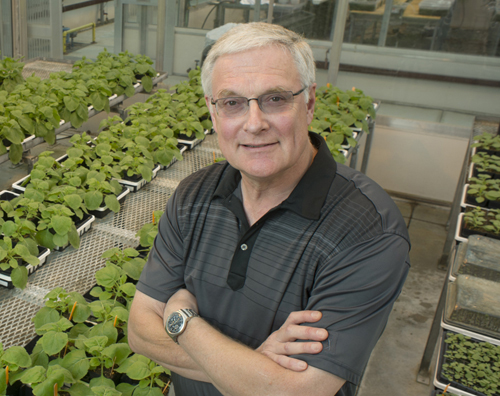Story by Katharine Tuerke, a member of the SPARK program (Students Promoting Awareness of Research Knowledge)

Tobacco is notorious for causing cancer, but now it’s helping to fight it.
Tobacco plants are being modified to create a biosimilar version of the breast cancer antibody trastuzumab (trade name Herceptin), which stops tumours from growing and encourages the body’s immune system to attack. The low-cost alternative antibody is being positioned as a product that can help cut health-care costs, particularly when Herceptin’s patent expires in three years.
Trastuzumab, made using tobacco plants, is slated to be on the market in 2016. Scientists have just completed testing in mouse models and found that the plant-based antibody was as effective in reducing the size of breast cancer tumours as the animal-based Herceptin.
Prof. Chris Hall, School of Environmental Sciences, developed the recombinant antibody technology used to create the plant-produced antibody. A Guelph firm, PlantForm, is licensing this technology, which would use tobacco plants as a host for the production of therapeutic antibodies.
“Traditionally it costs $450 million to produce 5,000 litres of an animal-cell-based antibody,” says Hall. “We can build a 12-acre facility with equipment and equivalent amount of antibody for $80 million.”
Typical drug production involves using bioreactors such as large fermentation chambers to grow bacteria or yeast, which are used to produce antibodies or vaccines. But PlantForm uses tobacco plants as a substitute bioreactor by genetically engineering its plants to include genes that make the antibody.
Tobacco plants are used for several reasons. Their molecular biology and genetics are well understood, and they have the same cell system as humans. They’re also economical to grow because they can produce large quantities of antibodies on a small footprint. And because tobacco plants aren’t part of the food chain, there’s no danger of spreading bacteria into the food supply.
“Using tobacco plants as bioreactors produces life-saving antibodies faster, more easily and more cheaply than traditional systems,” says Hall.
Here’s how the process works. As the tobacco plants grow in controlled-environment greenhouses, scientists cultivate a bacterium that transfers the antibody’s genetic information into the plants. Each plant is dipped in the bacteria, then a vacuum is used to push it into the plant. Within eight days, the antibody is expressed in 90 per cent of the plant, which is then harvested.
With the mouse-model testing now complete, the next step is to put the antibody through human clinical trials.
From this current work, Hall and his team also plan to develop several low-cost plant-made alternative antibodies designed to combat colorectal cancer, head and neck cancer, and HIV/AIDS.
Hall holds the federally funded Canada Research Chair in Recombinant Antibody Technology.
Funding for this project was provided by the Partnership Agreement with the Ontario Ministry of Agriculture and Food, and the Ministry of Rural Affairs. Additional funding was provided by the Natural Sciences and Engineering Research Council, Ontario Centres of Excellence and the National Research Council of Canada Industrial Research Assistance Program.